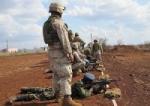
Originally Posted by
Dayuhan

That may be "the question" for Syrians, though it seems they are defining "the question" more in terms of whether or not Assad should go. I see no reason why it should be "the question" for the US to ask, nor any reason why it should be our business to define "the question" for Syrians.
I am not "the US," I'm just a guy expressing my opinion on what the question for the Syrians should be.
What "reform process" would that be, and what business would any foreign government have with it? I don't see any evidence of any "reform process" of any kind. This isn't about the Constitution, it's about Assad, who will do as he wishes regardless of what the Constitution says, until and unless he's overthrown.
Taking out Assad is a "reform process" but not likely to be a very stable or effective one for the Syrian people. Assad implenting true reforms linked to acutal perceptions of grievance of the rebelling populaces, while sustaining support of non-rebelling populaces would be better. A constitution can help get at that, but it really depends on the content and nature of the document and the degree of trust and buy-in across the populace. I haven't seen anything that indicateds Assad sought that input, so I doubt it will have that buy-in. My comment was that I think he should have been more transparent and inclusive in the process for best effect.
I don't ee any connection between Saudi involvement in Syria and audi domestic politics. Seems to me the Saudis just see an easy low-risk chance to stick it to the Iranians indirectly, and want to exploit that opportunity. How would Saudi involvement in Syria alleviate any domestic issues? In fact the Saudi are relatively secure at home at this point - one reason why they're being a bit adventurous outside the borders - and the supposed "conditions of insurgency" are a lot lower than they were in the late 90s. That's less a function of internal security mechanisms than of the prosperity brought by high oil prices and by a widespread view among Saudis that disorder is scarier than tyranny. It's not an unreasonable view: they know they're sitting on something that everybody wants, and that internal instability would likely draw in the vultures. While the royals may not be popular, they do enjoy an intrinsic popular perception of hereditary legitimacy (incomprehensible to an American, but our opinions are irrelevant), and few alternatives have emerged hat have any popular support at all.
Countries act based on their perceptions of their interests. Saudi Arabia acts on the percptions of the interests of the Saudi family. That is significantly different. They don't typically act openly to support such events, they are now. There is a reason. My belief is that it is related to their growing concerns over their own ability to sustain security at home. Reasonable minds may differ, and I certainly have not discussed this with the King
We need to be more flexible as the who leads the nation?? How is it any of our business? We don't decide who leads Saudi Arabia. For better or worse, the Saud family leads Saudi Arabia. They don't need our approval or help to maintain that rule, and our influence over how they rule is slim to none.
We felt it was "our business" in 1945 and committed ourselves to sustaining the Saudi family as part of our bargain for special access and influence in the Kingdom. More accurately it was the "ways" we applied to secure our national interests in the Arab penninsula. My comment is simply to note that I believe those "ways" are in need of a major refresh; one based in a stated position of our wilingness to work with any form of government in power there regardless of who leads it. Stable oil prices are "our business" and approaches that used to work to produce that are not working so well in the modern age.
I suspect Assad is beyond the point of compromise. We can say what we will about what the audis "must" do, but they won't listen to us and we can't compel or persuade him to do anything they don't want to do, so there's little point in discussing it. As for us... well, people are indeed speaking, but they're saying a whole bunch of different things, many of them contradictory... as anyone reasonable would expect. As always, we'll listen to those who tell us what we want to hear, which makes compromise complicated.
He is compromising, so clearly not "beyond the point." Is it too little too late? Quite likely. I agree that the people are saying many things. It is just noise. Let them pick trusted representatives of their many facets and allow them a forum to express those positions more clearly and to shape a constitution and how Syria transitions over time to a leader wanted by the majority of the people. That may well turn out to be Assad.
The media in Homs are clearly trying to generate a "Benghazi moment", but I doubt that it'll work, at least not if "working" means generating direct foreign intervention. I don't think the US gives a rats ass about what the Russians or Chinese think, but the administration does have to notice what the voters think. Another military commitment would not go down well with Obama's base, and there's an election coming up... and without US participation it's difficult to see overt intervention happening. If it's gonna be covert, better let the Saudis do it.














Bookmarks